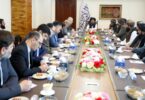KABUL (Khaama Press): US Congress’ study group calls on the Biden administration to slow the US troops’ withdrawal from Afghanistan, remove the May deadline and reduce the number of forces based on the conditions.
The report indicates that withdrawal of international forces by May 1st, could lead to civil war in Afghanistan, the group began its Congressionally mandated work in April 2020 after the US-Taliban agreement in February.
“We have an interest in an Afghanistan that respects basic human rights. We do not, however, believe that securing these interests requires a permanent US military presence in Afghanistan,” the group said in the report.
According to the bipartisan report “an immediate diplomatic effort to extend the current May 2021 withdrawal date in order to give the peace process sufficient time to produce an acceptable result.”
The study group recommended that the peace process should clarify the end state, reinforce the conditionality of final US troop withdrawal, clarification of US commitment to the current Afghan state, designing overarching regional diplomatic strategy, and work diplomatically for the promotion of success in peace talks.
It also mentioned that conducting counterterrorism operations and supporting Afghan forces are the key objectives of the US military to help create circumstances for an acceptable peace agreement.
“It should not, however, simply hand a victory to the Taliban,” it said.
“Key consideration of the Study Group was that while we support the values of the Afghan government and recognize that its collapse could create significant problems for the region and beyond, US decisions about America’s presence in Afghanistan cannot be held hostage to the divisions, ineffectiveness, corruption, and shortsightedness that the Afghan government has too often displayed,” the report says.
The report suggested that a reemphasis on diplomacy and negotiation, including a regional diplomatic strategy implemented over the longer term.
The report also suggests a review and reemphasis on diplomacy and negotiations, including regional diplomatic strategies for longer terms.
“There is broad regional support for a US withdrawal that is responsible rather than precipitate and chaotic. Many countries in the region, especially Pakistan, have influence over the Taliban and other participants in the peace process. They should actively use this influence to make the peace process successful because they will ultimately benefit from its success,” the report says.
The report adds that Afghanistan’s long conflict has entered a new and potentially final phase: a real opportunity to reach a peaceful resolution exists, but the forces of fragmentation remain strong.
“The United States can play a key role in determining if this opportunity is taken. A responsible and coherent set of US actions could greatly increase the chances of a peaceful resolution to forty years of conflict; a rash and rushed approach could increase the chances of a breakdown of order in Afghanistan and a worsening of this long and tragic war with negative consequences for the region and heightened threats to the security and interests of the United States and its allies,” according to the report.
The report also urged the US to maintain agreement with the Taliban, however, the group in the report said, it would be very difficult and impossible for the agreement to be achieved by May 2021.
To achieve overall objectives in the agreement that meets US interest would require an extension of may deadline.
“This would create the necessary space in which the Study Group’s five recommended main lines of effort could be implemented: o First, we must refocus our regional diplomacy on securing support for the peace process.
o Second, our civilian and military assistance to the Afghan government must continue to support core state structures, but with conditions derived from the Global Fragility Act that emphasize greater accountability, legitimacy, and inclusion across all lines of assistance and with strong incentives for the government to play a constructive role in the peace process. It is important to emphasize that the objective of aid is not charity but to prevent the sort of state collapse that would be contrary to our interests.
o Third, our military presence in Afghanistan must continue to focus on its counterterrorism function while giving greater emphasis than before to shaping conditions that enhance the prospects of a successful peace process.
o Fourth, the United States, which has long supported Afghan civil society, needs to acknowledge the crucial role that civil society has played in securing critical development gains to date and can play during both the negotiating process and the implementation of an eventual peace agreement.
o Finally, as we enter into this ebbing phase of our involvement in Afghanistan, the United States must not forget that we entered Afghanistan as part of a wider international effort. Our NATO allies in particular have been steadfast in their support and have shared the sacrifice; over a thousand coalition troops have been killed since 2001. Our future in Afghanistan must be decided in consultation with these allies and partners”.






